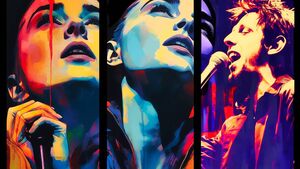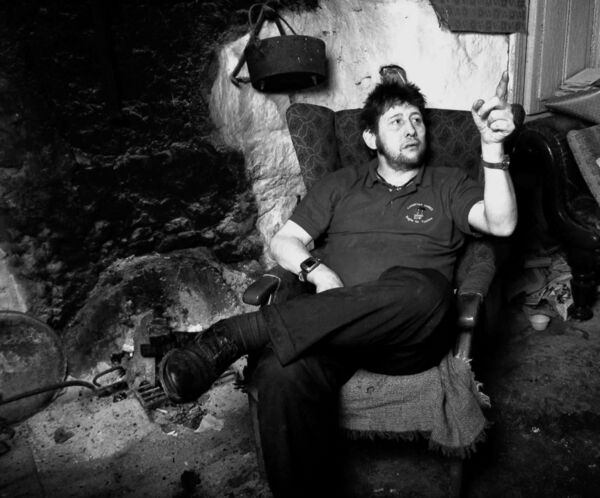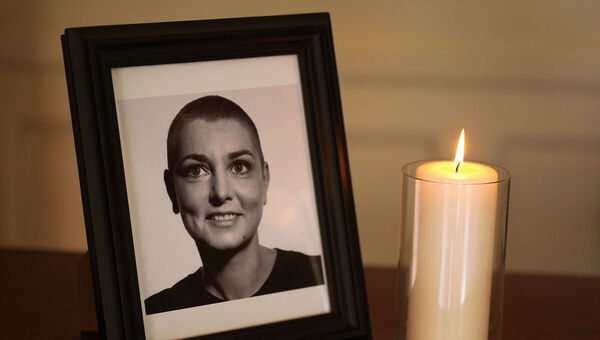Sinéad and Shane made us believe in the divine

Sinéad O'Connor and Shane McGowan forcibly dragged Irish music into new realms.
I was sitting at my desk, the rain pattering the window, when the headlines flashed - the second of Ireland's most storied voices, Shane McGowan, had passed away, mere months after Sinéad O'Connor drew her final breath. Though I never met either legend, their deaths resonated with unexpected force, leaving Ireland to mourn two icons who profoundly stirred, inspired and unsettled us over the years.
My first glimpse of Sinéad came as a student when her arresting smash, , played relentlessly on MTV and radio. That crystalline voice - so pure, defiant and haunting - instantly seized the imagination. As I later discovered her recordings, I was struck by her willingness to tackle taboos, unflinchingly excavating systemic abuse in church institutions, racism in the justice system, and the ruthless machinery of the music business. Sinéad fearlessly devoted her art to revealing these problematic truths, heedless of the consequences to her soaring career.
I had encountered Shane a bit earlier and was surprised and fascinated by those first snarling, slurring notes of . The voice was outrageously raw; it startled me - was this even singing? Yet I was soon utterly enthralled by the boozy, bruising ballads and jigs, riotous mythic poetry set to wild music. Shane spun yarns that teemed with improbable details yet somehow rang emotionally true.
Of course, in time, I came to know their real lives were bitterly troubled, beset by trauma and demons that their fame often intensified. Sinéad endured harsh denunciations for protesting injustice, while Shane surrendered his gifts to alcohol's ruthless grasp. Yet this never diminished my awe for their creative brilliance, which profoundly kindled Irish songwriting in the following decades.
What enthralled me was their paradoxical fusion of fragility and power. Sinéad coupled that crystalline instrument with steel conviction while Shane sprung commonplace bar chatter into high art. Both were hothouse orchids yet demanded Ireland and the world bear witness.
And bear witness we did, channelling the strange alchemy of fame, transforming individuals into canvases society projects upon. Every virtuoso who finds recognition must resolve the dissonance between being human and serving as an icon.
Sinéad and Shane short-circuited this compact by refusing conformity - she spoke too bluntly, he drank too hard - and the greater public turned viciously upon both. Their breakdowns became entertainment fodder as cameras recorded each wince-inducing misstep. Meanwhile, their cultural contributions were minimised in the tabloid press - Sinéad was a one-hit-wonder tear away, and Shane was a lucky drunk who happened upon a hit.
But we as a nation understood and never forgot them, returning to their songs in our bleak periods of national self-doubt. And we sensed that below the tabloid dramas burbled two sensitive spirits who yearned to translate emotional truths into stirring sounds that might heal our collective wounds - if only we would let them.
Some recognised their brilliance in time – posthumously President Michael D Higgins hailed Shane among music's greatest lyricists, while Bono claimed he spoke hard truths without diluting his art. And a widening circle affirmed Sinéad as a multifaceted talent who fearlessly melded activism with creativity.
So when the word came of their passing, we sat stung by nostalgia as their death knells tolled across our still emerald fields. I raised a toast from my favourite Irish whiskey, regretting never having met them. Yet the intimacy that the artist and beholder share needs no physical proximity. The inspiration they spark is far more significant, propagating through every written word and song. This is the sacred chain linking true creators across time and space.
I had my own small link, as do all, in that chain, their voices providing the backdrop to every Christmas celebration and social outing of my youth. But away from the stellar hits, both artists sought to channel their bravery and brilliance, giving voice to silenced stories. This is their legacy's locomotive - a runaway train of influence forever fused to Ireland through immortal song.
We shall not see their likes again. Yet Sinéad and Shane roll onward, borne in melody and passion, and we are all a little changed by encountering their art.

As I stated earlier, I regret not meeting either luminary. Indulgently, I imagine myself hunched in a snug when Shane lurches through the doors, his cavernous cheeks rouged by rosacea, eyes glinting with intelligent mischief. We might slop through rounds of inky stout as he unspools gritty ballads and old rebel songs, his craggy baritone rumbling melodies from distant foghorn memories. His words growing increasingly poetic yet obtuse through the night - Joycean streams of consciousness and ribald jokes. By dawn, my fuzzy brain would overflow with fragments I would scarcely decipher - diamonds scattered amid drunken disorder.
I imagine meeting Sinéad, her head swathed in a hijab instead of the notorious tonsure. Surprisingly soft-spoken, she would wistfully admit fatigue from ceaseless prodding of her mental health and personal traumas. We might have conversed over mugs of strong tea as I glimpsed the sensitivity fuelling her genius and downfall - two sides of the same thorned rose.
Of course, their careers followed wildly disparate trajectories. Shane founded The Pogues and channelled influences from The Clash to poets Patrick Kavanagh and Brendan Behan, his lyrics conjuring a phantasmagoria of the Irish diaspora - from Liverpool docks to Manhattan tenements.
Sinéad's talent impressed from the outset with its spectral purity, signed by record executives envisioning a pop princess. But she rebelled against convention, addressing corruption and racism with fearless ambition instead of courting airbrushed stardom.
And both were ultimately overwhelmed by their excesses - Shane surrendered to alcohol's ruthless thirst as Sinéad contended with the harsh denunciations targeting outspoken women. Their fame amplified struggles with trauma and stability.
Yet each created a singular body of work. Shane achieved astonishing artistry at his peak, blending uncanny emotional acuity with improbable details that made every tall tale believable. And whether crooning or caterwauling, he fully inhabited each shanty and dirge as if his soul depended on it.

Meanwhile, Sinéad's singing retained an ethereal purity unrivalled by contemporaries. She instinctively employed her voice's dynamics to amplify meaning, flitting between Gregorian chant raptures and full-throated accusations. And despite fame's fickle finger moving on commercially, she never ceased striving creatively, her spiritual ecumenical curiosity leading to bold artistic choices.
Shane and Sinéad take their rightful places in Ireland's pantheon of immortal yet tormented talents who hastened their own ends - a romantic tradition stretching from Brendan Behan and Luke Kelly to Phil Lynott and Richard Harris. Yet simply dismissing them as caricatures - crazy banshee and drunken poet - profoundly misses their cultural impact.
Each became an archetype that also transcended archetypes. They forcibly dragged Irish music into new realms, challenging the boundaries of popular entertainment. Often through controversy and chaos, their outsider perspectives interrogated injustice, exploitation and orthodoxy, resonating widely by spotlighting themes often ignored. And their defiant, creative spirit stands immortal.
As I write this, I am gazing at images of these kindred souls. Here is Shane grinning roguishly, cigarette cocked in mouth, left eye straying while the right pierces through. And here is Sinéad, face upturned to some distant heaven, lights illuminating her sharp features in stark relief resembling a shorn Joan of Arc defying immolation.
I never met them in the flesh, yet their essence still feels palpably present and beautifully blurred - banshees and boozehounds, angels and demons, mirrors reflecting some true unnamed thing inside the Irish spirit. I wish I could offer one more toast to their restless souls. But we may meet in some future poem or song. In existence beyond this earthly realm, I feel Shane is already scribbling lyrics and calling for stout while Sinéad sings the chorus, her ethereal voice sailing heavenward. Two more Irish wanderers changed utterly, changing everything they touched along the winding way. Theirs was that kind of lethal magic that made me believe in the divine.




